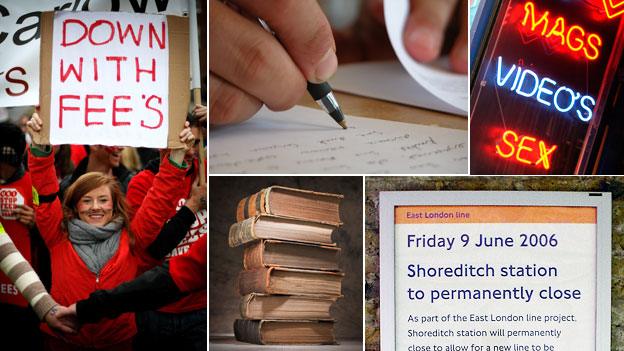Apostrophe now: Bad grammar and the people who hate it
- Published

Children are again to be subject to a rigorous examination in grammar. But why does it make adults so cross when other adults break the rules?
A new grammar and spelling test arrives in primary schools in England this week, external. It is the first time in a while that such emphasis has been put on grammar.
Some of the questions will seem straightforward for many adults, such as where to place a comma or a colon in a sentence. But other aspects - identifying different types of adverbs or distinguishing between subordinating and co-ordinating connectives - might raise eyebrows.
Grammar is not just an educational issue. For some adults, it can sabotage friendships and even romantic relationships.
The research arm of dating site OKCupid looked at 500,000 first contacts, external and concluded that "netspeak, bad grammar and bad spelling are huge turn-offs". The biggest passion killers were "ur", "r", "u", "ya" and "cant". Also damaging to online suitors were "luv" and "wat".
On the other hand, correct use of apostrophes was appealing. Using "don't" and "won't" caused better than average response rates - 36% and 37% respectively, according to the research.
Twist Phelan, an American writer who went on 100 online dates in 100 days and later married someone she met online, says grammar is a vital "filter system". It shows care has been taken when sentences are grammatically correct. "If you're trying to date a woman, I don't expect flowery Jane Austen prose. But aren't you trying to put your best foot forward?"
It also satisfies the intellectual snob within us. Phelan wanted to find someone at ease with language.
But grammar can be a linguistic minefield.
Grammarians argue it ensures clarity and elegance. For others, it is a series of archaic rules beloved of pedants, bearing little relation to how people really communicate.
The Idler magazine's Bad Grammar Awards recently named and shamed a letter by academics, external for saying that the national curriculum demanded "too much, too young" - thus confusing an adjective and an adverb. Another transgressor was Transport for London for its sign "It is safer to stay on the train than attempting to get off" - mixing up gerund and infinitive.
But the Times hit back in a leader, external attacking "grammar scolds" who worry more about rules than clear, idiomatic English.
It isn't always obvious what constitutes good and bad grammar.
The 17th Century poet John Dryden is said to have invented the notion that you can't end a sentence with a preposition, which has led to heated debate ever since. And what about starting a sentence with "and"?
The ever-encroaching use of "like" instead of "as if" can offend traditionalists, such as in the sentence: "I feel like I'm going to be sick."
Mixing up your modals - "might" and "may" - is another bugbear. As is the grocer's apostrophe, so-called for its frequent appearance in fruit and veg shops advertising apple's, pear's and sundry other green's. "Can I get…?" is for some an offence that should lead shopkeepers to frogmarch the culprit off the premises.
Some supermarkets, having been condemned for signage reading "10 items or less", now use "fewer" instead.
Semi-colons can provoke strong reactions; the novelist Kurt Vonnegut Jr advised people to avoid them altogether. "All they do is show you've been to college."
And sentences without a verb?
Some grammar defenders can be "extremely prissy", admits Harry Mount, author of How England Made the English. But good grammar matters and the new test is to be welcomed, he argues.
So where do you draw the line between pedantry and slovenliness? Mount says the split infinitive is perfectly acceptable. "To boldly go, sounds better than to go boldly," he argues. The word "whom" sounds archaic so there's no need to worry about who and whom, he says.
But anything that damages meaning and clarity should be avoided. For instance, the apostrophe should be defended at all costs, he says.
He was against the decision by bookseller Waterstones to drop its apostrophe. "It does annoy me because there's a reason to it. The apostrophe is correct because it was set up by Tim Waterstone not by someone called Waterstones."
Linguist David Crystal disagrees. The rules of English grammar are often murky and can be ambiguous, such as in the case of King's Cross, which is written with and without an apostrophe, he argues.
The new test has some sensible questions but its insistence on a black-and-white answer is wrong, he says. "It is a turning back of the clock."

He highlights one "correct" answer in the test: "We'll need a board, counters and a pair of dice." Placing a comma before the "and" - known as the Oxford comma - would be marked wrong despite being an accepted form of English, he says.
"If so, it means the whole output of Oxford University Press is wrong," Crystal says.
Grammarians push Standard English at the expense of other forms, he asserts. It's an elitist view that ignores, for example, Americanisms and all the different ways of communicating online. Context and appropriateness are what really matter, Crystal believes.
The proliferation of different forms of writing can create a dilemma - to stick with formal grammar or relax one's guard.
Financial Times columnist Simon Kuper wrote recently that he'd stopped using commas in text messages, external. Moral panic over grammar has been around since at least AD63, according to Columbia University linguist John McWhorter. And yet, the opposite trend is at work, Kuper argues, with social media promoting more memorable, pithy writing.
People have a tendency to believe that they're in the right on grammar; it is other people who let the side down.
"We may tend to feel that we select and organise words deliberately and adroitly," says Henry Hitchings, author of the Language Wars, "and we may therefore be unsettled by other people using language less selectively, felicitously and crisply."
Grammar is connected to values in people's minds. "Grammar peevers" in projects such as the Apostrophe Protection Society see "a connection between secure syntax and moral excellence", Hitchings argues. "There's a feeling that if we can maintain grammatical order we can maintain other kinds of order."
Or is it just a handy shortcut? People make judgements about each other all the time for superficial reasons. Basing such assessments on use of language is fairer than the alternative, says Times columnist Hannah Betts.
"I'd never dream of ruling anyone out because of trivia such as their job, accent, class, or the like. However, grammar and spelling are absolute deal-breakers. I'm a stickler for apostrophes, the correct use of 'less' and 'fewer' and terms such as hoi polloi - so often blunderingly confused with its opposite."
One has to be careful, cautions Patrick Wilson, founder of the Tutor Crowd, which works with young people. "There's a danger people can be too judgemental."
He, like many of his students, used to struggle at school with grammar and spelling. "Knowing when to use a semi-colon is not a determinant of intelligence. It's a determinant of whether you can follow rules."
The split infinitive is the most celebrated of grammar conundrums. Henry Fowler, author of the Dictionary of Modern English Usage, published in 1926, summed up the debate as follows.
"The English-speaking world may be divided into (1) those who neither know nor care what a split infinitive is; (2) those who do not know, but care very much; (3) those who know and condemn; (4) those who know and approve; and (5) those who know and distinguish. Those who neither know nor care are the vast majority, and are a happy folk, to be envied by the minority classes."
Grammar is provocative. But perhaps it's an itch that English speakers need to scratch.
You can follow the Magazine on Twitter, external and on Facebook, external